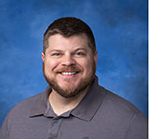This post was written by NCTE members Matthew Kruger-Ross and Pauline Schmidt.
Our podcast story is quite unique—it started out as an assignment completed by our students, and now it’s a fantastic way for us to document and reflect on our teaching.
Three years ago, we inherited a syllabus for the course “Technology in the English Classroom” that included a podcast assignment. At the time, it was modelled after “This American Life” and was called “This West Chester Life.”
While this assignment yielded some interesting topics and collaboration, some of our student groups chose topics that were much more linked to the undergraduate experience than that of a preservice teacher.
As luck would have it, I (Pauline) read Mary Styslinger’s Workshopping the Canon, and the supplemental chart that identified thematic connections to canonical texts inspired a book-pairing/book club idea for the podcast. We went through the resource and identified our eight pairs and thought about how to structure the class to incorporate this updated assignment.
In the end we were still faced with problems: some groups had inferior recording devices and the podcasts were hard to hear, while other groups needed a more experienced educator to guide the conversation. A few brainstorming sessions, a funding opportunity from our university, and a twitter poll later, . . . and the Notorious Pedagogues podcast (https://anchor.fm/notorious-pedagogues/episodes/Meet-Drs–Schmidt–Kruger-Ross-e30mgd) was born!
We’ve just been through our third iteration of the course, but the first with us guiding the podcast experience, and we really feel that this was the best version ever. We hosted the book club conversations with our students and helped them dig deep into these texts; we challenged them to think about the texts as readers, but also as future teachers. We provided a quality recording and the students still got the experience of editing and revising for the final product.
We solved two student problems with one ambitious project of our own; but, the real bonus was everything we learned along the way.
First, we realized that the podcast was a great model for our students. In some episodes we unpack things that didn’t work in our class. One student revealed to us that she was relieved to hear that things are never perfect, no matter how long you’ve been teaching.
We also learned that we could “flip” certain aspects of our class by using some of the episodes as “homework.” (If you look up our podcast, you’ll find some episodes that give the specific details about assignments.)
Finally, we realized that since we co-teach, the podcast was the perfect venue for our debriefing and documenting our own journey. It has led to presentations, papers, and (hopefully) more substantive work.
We are still—and always—learning, but hope to continue our podcast with future students. We’re open to suggestions as we envision this class’s evolution. Feel free to contact us at pschmidt@wcupa.edu or mkruger-ross@wcupa.edu with questions, comments, or inquiries.

Pauline Schmidt is an associate professor of English education at West Chester University of Pennsylvania. Her research and writing interests include arts-based pedagogy and critical issues in teacher education. She is also the director of the Pennsylvania Writing and Literature Project.
 Matthew Kruger-Ross is an assistant professor of educational technology at West Chester University of Pennsylvania, His interests include philosophy of education/technology and the hermeneutic phenomenology of Martin Heidegger. Together they are the Notorious Pedagogues who read, write, teach, and podcast about co-teaching a technology methods course for future secondary English educators.
Matthew Kruger-Ross is an assistant professor of educational technology at West Chester University of Pennsylvania, His interests include philosophy of education/technology and the hermeneutic phenomenology of Martin Heidegger. Together they are the Notorious Pedagogues who read, write, teach, and podcast about co-teaching a technology methods course for future secondary English educators.

